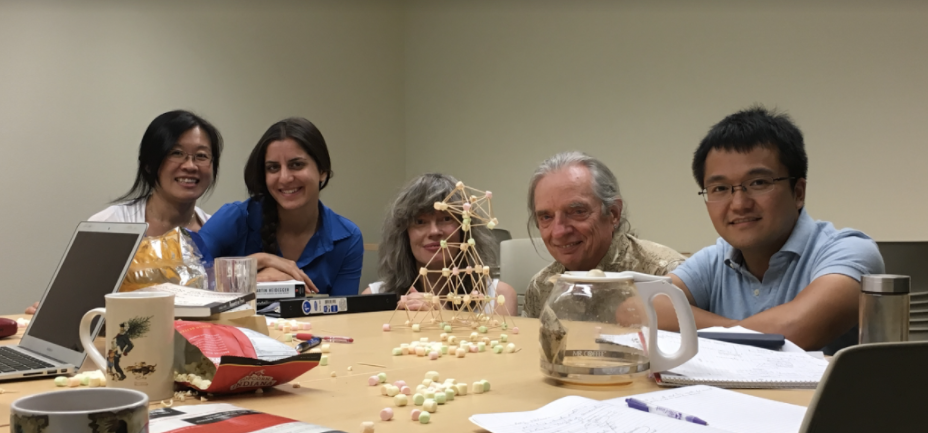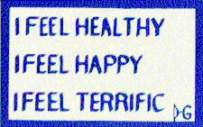| David Boje 655 |
Plan
Choose organization system you want to study (such as our own university, a supply chain, an organization strategy, slavery in modern organizations, or some other systems problem space). This course helps doctoral students develop qualitative and quantitative (metrics) analyses, called 'qualimetrics', the 'social' and the 'material' agencies of systems. This includes "propositions embodying a qualitative descriptive generalization about organizations" (March & Simon, 1958: 8) and metrics of quantitative kind such as scalability, fractals, and so on, as in Sierpinski Fractal in the photo above.
This year my newest book is about written about dialectical spiraling systems and I invite you to apply it in your work this term:
Title:
Organizational Research Methods (ORM):
Storytelling In Action
Publisher Routledge (due March 2018)
The focus of ORM Storytelling in Action is one developing 4th Wave Grounded Theory, since the first three waves have fallen into disrepute, and are challenged by every top tier journal in the Academy of Management. Let's put the historical development of 'Grounded Theory' in form of a spiral, with four whorls (or waves).
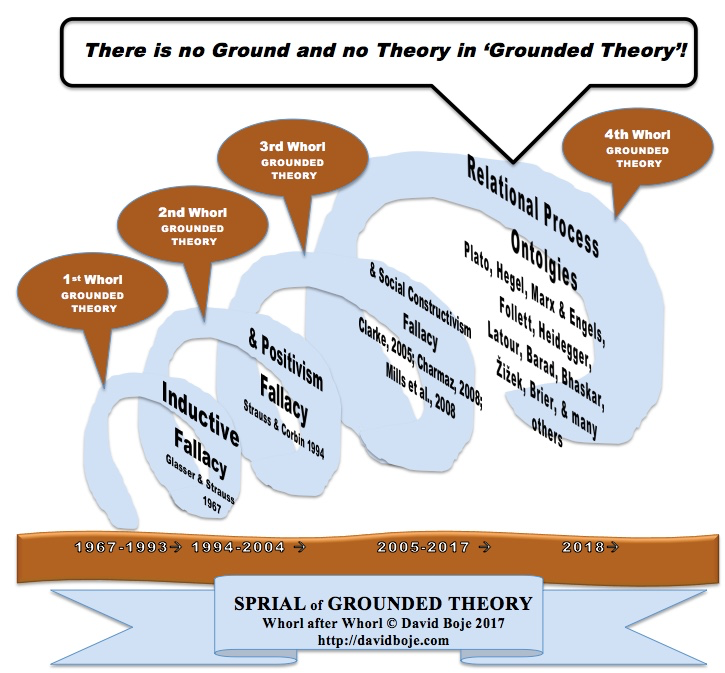
Figure 1 - The Grounded Theory Spiral - Whorl by Whorl (© D. M. Boje, 2017)
First wave GT (1967-1993) commits induction fallacy by doing qualitative method to generate theory propositions out of practice that go untested and ignore historical context (Glaser & Strauss, 1967).
Second wave GT (1994-2009) adds deductive fallacy of logical positivism reductionism. It applies existing theory frameworks, and then uses positivistic coding to fit in interview and observation content into abstract schemata (e.g. Strauss & Corbin, 1994: 21).
Third wave GT (2010-2017) tries to rescue 1st and 2nd waves (still unfurling) with ‘social constructivism’ epistemology. Clarke (2005), Charmaz (2008), Mills et al. (2008: 27-8) prefer a social constructivist turn in GT, and accuse Strauss and Corbin (1990, 1998) of never addressing which paradigm (i.e. positivism, interpretivism, hermeneutics, etc.) underpins their thought.
Fourth wave GT (see Study Guide before swimming in streams below). Each takes the turn to ‘ontology’ of the spiraling system, putting context on center stage of the vortices, exploring embodiment and sociomateriality of how people and planet are getting along in organizational systems (Boje, Saylors, Svane, & Hillon, in review). We propose several relational process ontological foundations to 4th wave (Dewey, Follett, Heidegger, Žižek, Brier, and Bhaskar respectively have different revisions of Hegelian dialectics).
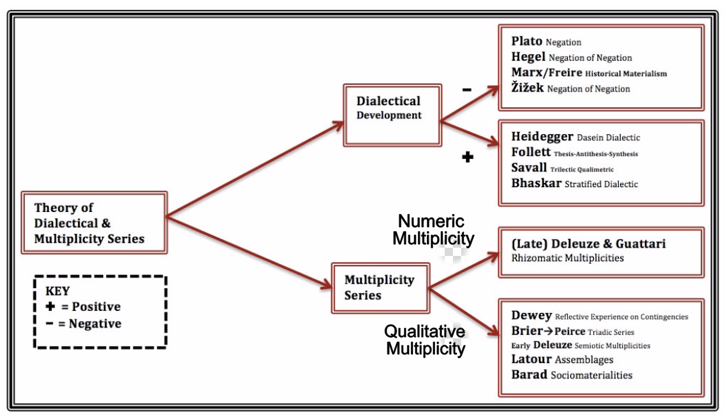
I believe the 4th wave relational process ontologies have some important highly practical implications. There are these multiple streams in 4th Wave Grounded Theory, and each is an ontology of Being stream, and each has these Streams:
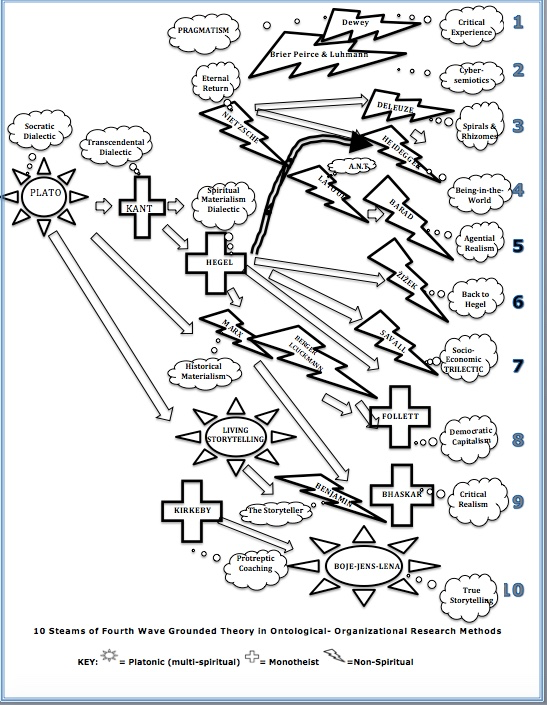
Figure 2: Map of 10 Streams of 4th Wave Grounded Theory © D. M. Boje 10 September 2017 (image original by Boje).

MARY PARKER FOLLETT, & ROY BHASKAR study guides at https://davidboje.com/655
Table 1: WHAT ARE 10 'ONTOLOGICAL-ORGANIZATIONAL RESEARCH METHODS' O-ORM)?
10 EXEMPLARS of STREAMS
ONTOLOGIC METHOD
1
DEWEY (American Pragmatism)
Qualitative-MULTIPLICITY
2
SØREN BRIER (<-Peirce + Luhmann)
MULTIPLICITY
3
GILLES DELEUZE (<-Nietzsche & Freud)
Qualitative- & Numeric-MULTIPLICITY
4
MARTIN HEIDEGGER (<-Hegel & Nietzsche)
+ DIALECTIC
5
KAREN BARAD (<-Bruno Latour & Neils Bohr)
Qualitative-MULTIPLCITY
6
SLAVOJ ŽIŽEK (<-Hegel & Lacan)
- DIALECTIC
7
HENRI SAVALL (<-Hegel & Plato)
+ TRILECTIC
8
MARY PARKER FOLLETT (<-Hegel & Whitehead)
+ DIALECTIC
9
ROY BHASKAR (<-Hegel & Heidegger)
+ DIALECTIC
10
DAVID BOJE, JENS LARSEN, LENA BRUUN (<-Plato, Ole Kirkeby, & Walter Benjamin)
+ DIALECTIC/ Qualitative-MULTIPLICITY
Learning Objective 1: Become Expert in one or more of these 10 Relational Process Systems Ontologies of Storytelling In Action.
start here --> REQUIRED 'NEW' BOOK Organizational Research Methods for Systems
What is relational? Relational is defined as both/and, rather than either/or thinking.
"Relational thinking rejects either/or binary thinking, for example, opposing theory to practice, scholarship to activism, or blacks to whites. Instead, relational embraces a both/and frame. The focus of relationality shifts from analysing what distinguishes entities, for example, the differences between race and gender, to examining their interconnections. The shift in perspective opens up intellectual and political possibilities" (Hill Collins and Bilge 2016, 27). [Hill Collins, Patricia, and Sirma Bilge. 2016. Intersectionality. New York: Polity Press.]
What is process? Process is not parts that make up a whole system. That is abstraction. Process is in spacetimemattering (Barad, 2007), with Being-in-the-world, a sociomateriality, ready-to-hand (Heidegger, 1962). It is not the steps in a PERT (programmed evaluation and review chart). It is not linear, but can have lines of flight that turn rhizomatic (Deleuze & Guattari, 1987). It is not the silliness popular in managerialist circles called BPR (business process engineering). BPR is a good way to destroy the processes of an organization.
What is ontology? There are many ontologies: positivism is an ontology. Historical materialism is an ontology. Plato's search for underlying forms in relation to forms, is an ontology. Heidegger says "'Ontology' means doctrine of being" (Heidegger, 1923/1988/1999: 1) [Ontology --- The Hermeneutics of Facticity translated by John van Buren. Bloomington & Indianapolis: Indiana University Press. It is available online for free download as pdf].
What is relational process ontology? There are at least these 14, and a whole lot more. Some emphasis material conditions over discourse. Others say social discourse and materiality are too entangled to be dialectic. Other look at a revival of Hegel, and others prefer Bhaskar's critical realism. Plato, Hegel, and Bhaskar include spirituality, but Marx and Engels, do not. In short, your task is to learn how they differ, and be able to use one or two, in field work studying an organization system. REQUIRED 'NEW' BOOK INDEX:
Learning Objective 2: Understand the 9 Stream-Ontologies of 4th Wave Grounded Theory and make your own contributions to one or two of them in a field research project.
I have a few principles of my own, that are relational process and ontological.
PRINCIPLE 1: "All organizations are perfectly designed to get the results they get. To get better results, you need to improve the design of the organization” ---from Arthur Wayne Jones, cited in David P. Hanna (1988: 38; 2001: 19; Boje, 2015, online). We can say all organizational systems, even the open systems, are perfectly designed to get the results they get. To me this is a first principle of relational process ontology.
There are upward spiraling and downward spiraling dialectical forces in what I am now calling ;relational process ontologic systems' of organizing and organization.
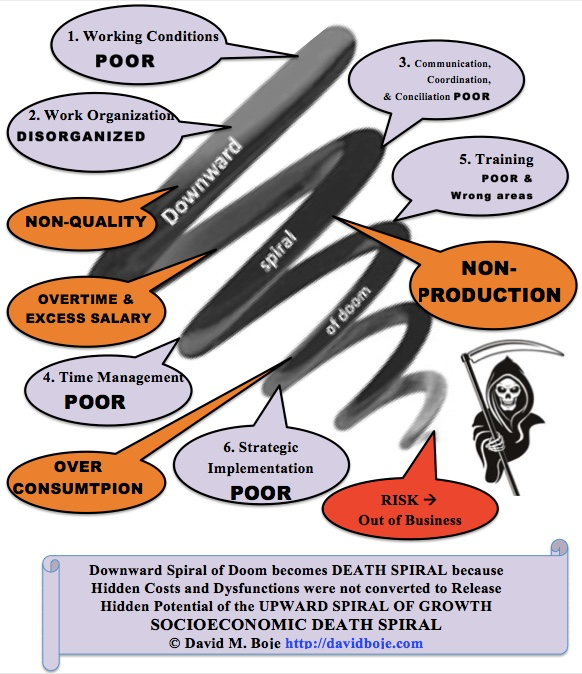
Figure 2: Death Spiral of System © D. M. Boje 2017 - see chapter on Plato's double twisted spiraling
PRINCIPLE 2: Spiraling Systems is a dynamic realtional process of Difference and Repetition. There are dialectical oppositions of net a give and positive, static and dynamic, extensive and intensive, ordinary and destructive, horizontal and vertical, revolving and evolving, equity and inequity (Deleuze, 1994 Difference and Repetition).
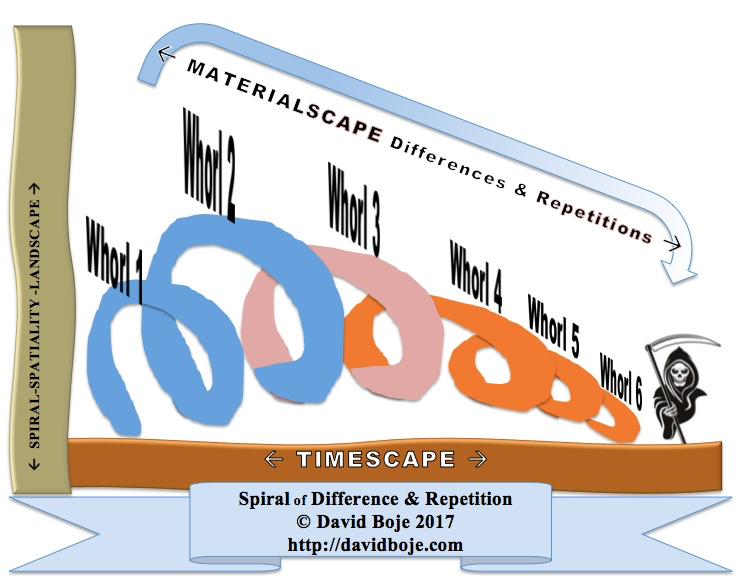
Figure 3: Spiral of Difference and Repetition in Landscape, Timescape, and Materialscape Ontology
In the figure above, there is a turning point (blue to pink) where the are changes in the system that are not brining production, quality, and so on. Dysfunctions and conflicts intensify as participants change their understanding of future turnings. This is a dialectical and ontological existence. There's more than one dialectical process. There is the conceptual dialectic (Plato, Hegel) and a dialectical existence (the acting and actions in spacetimemattering, to use Barad,s 2003, 2007 term). Spiraling is for Deleuze (1993: 13) a "repetitive milieux) of real and conceptual oppositions, some conceptual, and some existential. Rather than a smooth upward or downward spiraling, there can be ups and downs in the sociomateriality of an organizational system, movements in spacetimemattering. Spiraling repetition and difference has system animations as the shape and form of the spiraling becomes sociomaterial. Whorl-after-whorl is an opposition of repetition and remembrance. Repetition and difference include forming habits of action, and habits of system thinking. TQM, for example, is the repetition of sameness in habits of production, while experimenting with quality changes (continuous improvement) in the moments of action. Systems grounded in petrification of formal identity will have a difficult time detecting whorl changes. The death spiral can remain unseen, masked or repressed, repeating the dysfunctions that wound a system spiraling downward in the first place. There can be what I call fore-caring (antenarrative preparation) for whorl awareness, and whorl intervention. It is possible to change systems.
Here is an example of my work with a system to implement changes in a Bingo-Spiral:
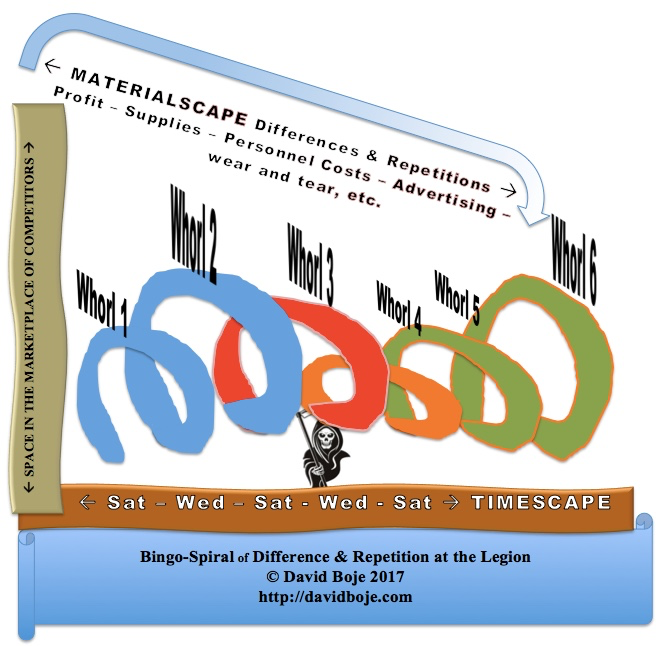
Figure 4: The Bingo-Spirals has Sunday & Monday WHORLS of different REPETITION proportion and substantive DIFFERENCE (© D. M. Boje 2017) Read entire report on Bingo-Spiral
Spirals have repetitions of the whorls (2 Bingo events a week) and differences (between whorls, some larger, others smaller) in three dimensions. Above I show five whorls of a dynamic spiral that has the dimensions of space in marketplace (landscape), time in a timescape, and materials in a materialscape. The three dimensions are inseparable, but let’s pretend we can tell them apart (Read entire report on Bingo-Spiral):
- SPACE (Landscape) IN THE MARKETPLACE OF COMPETITORS - St. Genevieve has the same $1,199 blackout as the Legion; Elks’ blackout is $800’; Three Crosses blackout is $700. There is also market space for Knights of Columbus and Tortugas (Mesilla). Legion is vying for top market share in the Landscape.
- TIMESCAPE – Sunday and Wednesday events all year round, and the preparation for the events, the managing of the events. Johnny and Clint start work at noon and leave at 9PM (or later), and then put in about 5 or more additional hours doing accounting, supply runs, and passing out flyers to boost attendance. They supervise 3 cashiers (none of whom are Legion members), 1 caller (not Legion), 4 cleaners working to empty baskets from each table 4 times each evening (1 is Legion), and 4 food people (none are Legion).
- MATERIALSCAPE – Material things like money, supplies, utilities, the hall, tables, chairs, and bodies (workers, managers, caller, clean up crew, food crew, Legionnaires there and not there, and customers there and not there), and any profit once bills are paid. A sizeable number of customers are families, some with children. Bingo materiality is not just the elderly. About 12 players are handicapped, and have reserved places in the materialscape of other players. I think if you counted the number of Johnny’s and Clint’s relatives, playing, it’s what keeps attendance excelling.
It’s all about repetition and difference: The whorls occur in repetition but the whorls are each full of difference. Spiral is a concept, a representation of the shape and form of the whorls. Spiral is also an Idea, what and how it does ‘difference and repetition’ of the spiral happen? Concept and Idea of spiral are not independent, and do interact. To manage and organize Bingo you have to understand the concept of spirals. And you also have a really good Idea of how whorls are repetitions of the event twice a week that can be quite different if you know what to observe.
Making a Difference is Opposed by Overcoming Indifference: There are two types of indifference among our Legion members. Type one is the Abyss of Legionnaires who will have nothing at all to do with bingo. You hear them saying “I hate bingo” or “I never play bingo” or “I have nothing to do with bingo.” Type two indifference is the scattered Legion members who only see the calm waters of bingo events, pay some lip service to bingo being important to fund the Legion’s other events and keep the hall open, but are no less indifferent than Type one.
Read entire report on Bingo-Spiral
Enjoy
I hope this gives you some introduction to systems thinking from a relational process ontology standpoint.
PLEASE SPREAD THE WORD ABOUT THIS UNIQUE SEMINAR EXPERIENCE -
